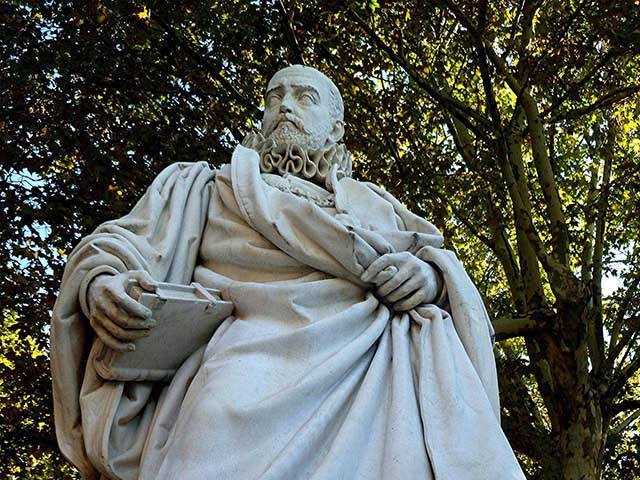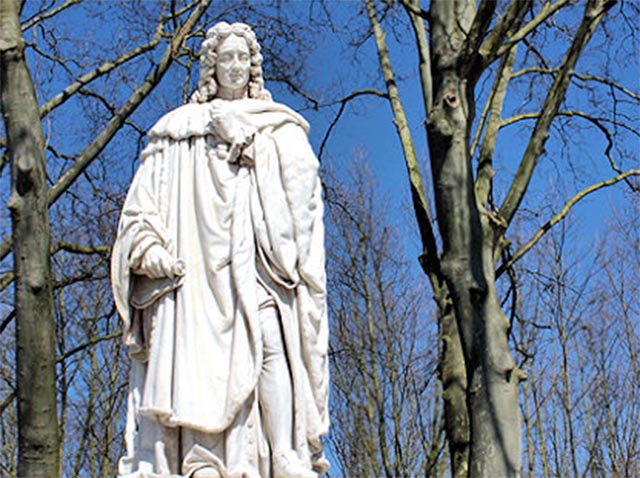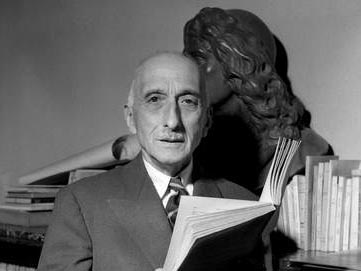Do you know the 3 Ms from Bordeaux?
Montaigne (16th century), Montesquieu (18th century) & Mauriac (20th century), are all three emblematic figures of French intellectual heritage and literature but did you know that they all come from the Bordeaux region? Hence the charming nickname "the 3Ms of Bordeaux"!
In the French literature history, very few cities can boast having been the scene of the very great men lives. Among them, Bordeaux stands out with 3 authors from major literary and historical currents and legacy :
- the first, Michel de Montaigne, one of the main figures of Humanism in France, is known for his Essays and also for his role as a magistrate in the Bordeaux Parliament where he sat for 15 years.
- The second, Charles-Louis de Secondat, known as Baron de Montesquieu, a moralist and political thinker and author of L'esprit des lois, is a key figure of the Age of Enlightenment and a precursor of modern political science.
- The third, François Mauriac, winner of the Nobel Prize for Literature in 1952 and a member of the French Academy for almost 40years, is perhaps one of the greatest French novelists of the 20th century.
Commonly referred to as the 3 M's of Bordeaux, they remain famous for their works and political commitment but also for having brought honour to a city that was dear to them !
MONTAIGNE, the wise man and philosopher
 Birth : 28 February 1533 at the château of the same name, near Bordeaux.
Birth : 28 February 1533 at the château of the same name, near Bordeaux.
He was born into an old family, but not illustrious. His father, though noble, wanted his son to associate with people of low status, and had him brought up the hard way.
After studying law, he began his career in 1554 as an adviser at the Court of Périgueux, then at the Parliament of Bordeaux where he sat for almost 15 years. During his time as councillor in Bordeaux, he formed a close friendship with another councillor of the court, Étienne La Boëtie. This young magistrate, who died at the age of 32, had composed a Treaty of Voluntary Servitude at the age of 16. Montaigne immortalized his name by the beautiful pages he wrote about the friendship that united them. Some go so far as to think that without his encounter with La Boetie, we would not be able to read the Essays today because they were written to discuss with us as he would have done with his friend.
In 1570, he sold his position as an adviser to the Parliament of Bordeaux, retired to his castle and began writing his Essays as early as 1572. In this book, Montaigne wanted, above all, to paint the man by painting himself. He adds personal reflections enamelled with Greek and Latin quotations.
We can guess how much he must have been affected by the misfortunes of his time. He had the pain of witnessing the massacres of St. Bartholomew's Day (1572), the fury of the League, the bloody atrocities of the Religion Wars.
Probably in order to find a cure for his illness from which he has been suffering for some years, Montaigne decided to try thermal cures in the famous spa towns throughout Europe. He reports his journey in his "Journal de voyage": this manuscript, kept for almost 200 years in the castle without anyone's knowledge, was not published until it was discovered in 1774!
While still abroad, he learns that he is elected mayor of Bordeaux in 1581, a position he is forced to accept at the insistence of the king, and interrupts his journey. As a mayor, he worked to maintain balance and peace between the different factions, a policy that seemed to bear fruit as he was re-elected. His political functions do not prevent him from continuing to write.
Like Rabelais, Montaigne attacked the shortcomings of his time: the superstitions of the Church, the disorderly morals of the monks, judicial injustices such as torture, the inquisition, etc... He was also the first to write on the subject of the "Inquisition". In controversial matters, like a rapporteur, he merely records the pros and cons, but rarely gives his opinion.
For me, the reading of the book is laborious. The narration is not followed, the author starts a chapter on a subject, abandons his idea and digresses.... In Les Essais, he talks about everything about himself, and about himself about everything; he asks himself a thousand questions, resolves them in his own way, without however giving the best solution? He questions his reader.
Today, Les Essais is considered the avant-garde of the blog. That's right... What are essays? A collection of reflections, articles, warnings, clarifications and blows of mouths, diverse and varied opinions on a multitude of subjects... halfway between a diary and autofiction... It can therefore be considered as the precursor of a genre that is all the rage in our time: the blog!
Anecdote: We know that Montaigne was buried in the former Feuillants convent built on the site of what is now the Aquitaine Museum. In 2018, Montaigne's tomb is thought to have been found and the progress of historians and archaeologists regularly appear in local chronicles...
Places of tribute in Bordeaux: A street (in the Grands-Hommes district), a monumental statue of Maggesi enthroned on the Place des Quinconces, his cenotaph exhibited and highlighted in the Musée d'Aquitaine, the Faculty of Bordeaux is called Université Bordeaux-Montaigne.
MONTESQUIEU, founder of political science
 Birth :18 January 1689 at Château de la Brède, a few miles south of Bordeaux.
Birth :18 January 1689 at Château de la Brède, a few miles south of Bordeaux.
Under his real name - Charles-Louis de Secondat - belongs to the nobility of the robe.
After studying law, he became an adviser to the parliament of Bordeaux in 1714. In 1715, his wedding with a Protestant woman brought him a large dowry. The young Montesquieu had little taste for his office...
He inherited his uncle's fortune, the office of the mortar president of the parliament and the barony of Montesquieu. Leaving his office as soon as he could, Montesquieu became passionate about science and conducted experiments (anatomy, botany, physics...) then directed his curiosity towards humanity through literature and philosophy. Passionate about sciences, he founded an anatomy prize at the Bordeaux Academy.
In the "Persian Letters", which he published anonymously in 1721 in Holland, he admirably portrays French society through the eyes of Persian visitors in a humorous and satirical tone. Far from being a source of reprisals, Persian Letters opened the doors of literary salons to him. Very critical of absolutism and its social shortcomings, Montesquieu, who believed in the need for reform, wished for France a constitutional monarchy in the English style.
From 1726, the writer left the magistracy to devote himself to literature, and began a journey across Europe. From this experience and his observation of different political regimes, he drew a political-philosophical analysis: De l'Esprit des Lois (1748). The resonance of this work and the influence it exerted on future thinkers made Montesquieu one of the first and most influential philosophers of the Enlightenment.
He remains one of the thinkers of the political and social organization on which modern societies rely. He was one of the first to think about the separation of powers into three areas: the executive, the legislature and the judiciary. Criticized by the church, he was not, however, hostile to the monarchical system. An announcer of the French Enlightenment movement, at the end of his life he took part in the encyclopedia adventure and died blind.
Places of tribute in Bordeaux: A street (in the Grands-Hommes district), the rue Esprit des Lois along the Grand-Théatre which would seem to be the only street in France to bear the name of a literary work, the Lycée Montesquieu, a plaque at n° 31 place des Martyrs de la Résistance where he lived, a plaque at 87 rue Porte-Dijeaux (now the Librairie Mollat) where he lived.
FRANCOIS MAURIAC, the committed and tortured writer
 Birth : 11 October 1885 in Bordeaux
Birth : 11 October 1885 in Bordeaux
Coming from a bourgeois, catholic and conservative family, François Mauriac will remain deeply attached to his Bordeaux roots all his life, as the city will appear in most of his novels.
His double ancestry can be found in his novels:
- An urban Catholic bourgeoisie on his mother's side...
- A bourgeoisie of landowners in the Southern part of Gironde, between the Landes foret and vineyards, on his father's side.
Sent to Salonika in 1914, François Mauriac, reformed for health reasons, hardly took part in the fighting. On the other hand, the post-war years were to be his years of literary success. He published several of his major works in quick succession, Le Baiser au lepreux (1922), Le Fleuve de feu (1923), Génitrix (1923), Le Désert de l'amour (1925), Thérèse Desqueyroux (1927), Le Nœud de vipères (1932), Le Mystère Frontenac (1933).
Cruel satires of the Bordeaux bourgeois milieu, his novels express the pathetic human condition, the painful anguish of the Christian, tortured by the difficult choice between God and the world, between flesh and spirit, between faith and passions.
At the height of his glory, in the mid-1930s, François Mauriac was to change the way he looked at the world; leaving literature somewhat behind, he was to engage in political struggle. Gradually moving away from the conservative positions of his youth, he began to denounce the fascist threat. When the Second World War broke out, François Mauriac chose his camp and took part in the intellectual resistance by clandestinely publishing articles in the Cahier Noir under the pseudonym Forez.
At the age of 60, the post-war Mauriac became mainly a political writer. From 1952 until his death, he was a columnist for Le Figaro, to which he had contributed since 1934, then for L'Express.
Finally, after having supported the policies of Pierre Mendès-France, François Mauriac found in the person of General de Gaulle the statesman in accordance with his wishes, embodying the values he had ardently defended. He was always in a movement of political commitment when he took a stand for France to choose the path of decolonisation in certain countries, such as Indochina, Morocco, Algeria and Tunisia.
François Mauriac was made Grand-Cross of the Legion of Honour by General de Gaulle. He died the same year as General de Gaulle in 1970.
Places of tribute in Bordeaux: A street (in the Saint-Michel district in Bordeaux), a bust sclupted by Zadkine in the Public Garden of Bordeaux (copy), the same bust in plaster in the Museum of Fine Arts of Bordeaux, the plaque on his birth house at N°86 rue du Pas-Saint-Georges in Bordeaux... Outside Bordeaux, you can visit the family home, now a museum at the Malagar Centre
Want to go further, contact me for your private tour of Bordeaux !
-
 Bordeaux Cognac tour guide
Bordeaux Cognac tour guide -
 Marie Hallier - Bordeaux Cognac Tour Guide - TéléProTour
Marie Hallier - Bordeaux Cognac Tour Guide - TéléProTour -
 @Bordeaux.cognac.tour.guide
@Bordeaux.cognac.tour.guide -
 @Teleprotour
@Teleprotour -
 Marie HALLIER
Marie HALLIER
Bordeaux, Licensed Bordeaux tour guide, Bordeaux Private Tours, Bordeaux tourist guide, Unusual Bordeaux Tours

Terms & Conditions
Report